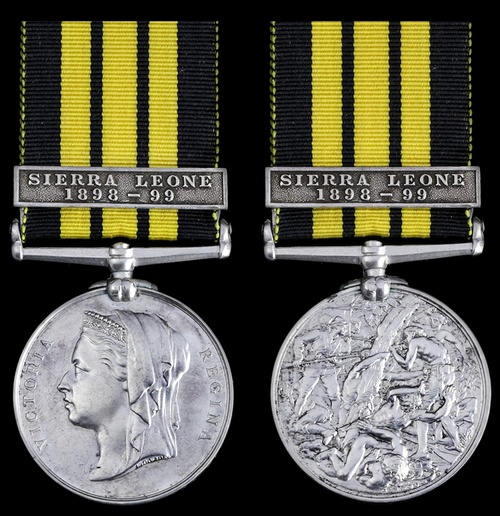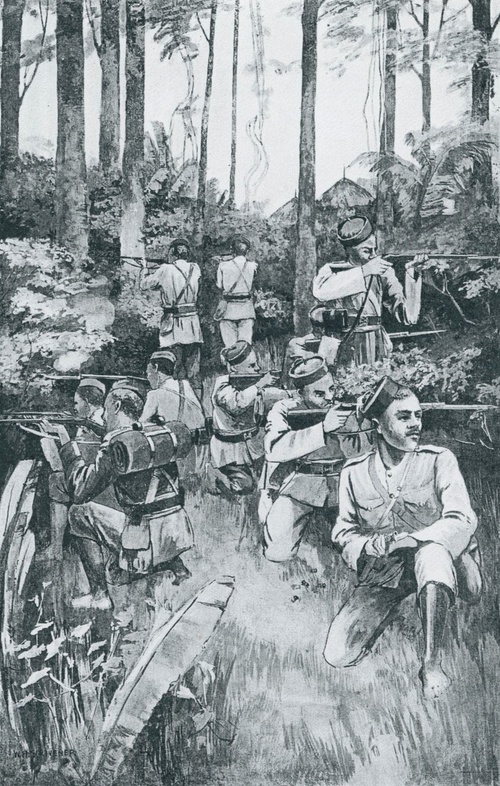Auction: 19001 - Orders, Decorations and Medals
Lot: 181
'We had landed near one of the towns and, having cleared it out, had, as usual, fired it. Most of our men were scattered about in small parties, foraging for loot. Dr. A. F. M. Berkeley, District Surgeon, who had gone far up on one side of the place, found himself on a path leading directly into the bush. With him were three Frontiers and two or three West India soldiers.
Suddenly, forth from the underwood, leapt a naked warrior, brandishing a long sword. The Doctor had only just time to present his revolver at the man, and pulled the trigger when - the pistol missed fire! He instantly flung his weapon in the other's face and turned to run for dear life. Ill-luck and the Mendi both pursued him. He slipped and fell on his knees, and his huge antagonist, only momentarily stopped by a shot from Captain Stewart of the West India Regiment - who had been a spectator of the scene - had already shortened his sword-arm in order to decapitate his victim. In another moment Dr. Berkeley would have certainly been killed, when Lance-Corporal Brimah Windai, a Frontier, by a well-aimed shot dropped the fellow in the very nick of time … '
High drama at the village of Kissy, May 1898; Our West African Empire, refers.
A notable East and West Africa Medal awarded to District Surgeon A. F. M. Berkeley, Colonial Medical Service, who saw much action in the Sierra Leone operations of 1898-99
His close shave with a huge, naked Mendi warrior aside, the Doctor survived all manner of hardship during several months of campaigning: in his published account of his experiences, he documents - among other fascinating facts - the damage caused his charges from 'small pieces of iron slugs of great penetrative power'
East and West Africa 1887-1900, 1 clasp, Sierra Leone 1898-99 (Dis: Surgeon A. F. M. Berkeley), good very fine
Augustus Frederick Millard Berkeley, who is believed to be a scion of the Earls of Berkeley, was born on 23 April 1868. Qualifying in medicine at Edinburgh University - he was appointed a Licentiate of the Royal College of Physicians and Surgeons of Edinburgh in 1893 - he joined the Colonial Medical Service.
A tour of duty in the West Indies ensued, as an Acting Junior Resident Surgeon at Barbados General Hospital in 1893-95, and as Government Medical Officer of St. John's Parish in Grenada in 1895-97.
Fighting Surgeon
In May 1897, Berkeley was appointed Assistant Colonial Surgeon in Sierra Leone in West Africa, in which capacity he quickly found active employment on attachment to the West India Regiment in March 1898.
As per Colonial Office records (T.N.A. WO 100/92), he 'accompanied the column of troops from Port Lokko to Karene; also in medical charge of the Imperial troops in Sherbro and Bandajuma Districts.'
To which facts may be added his stint as an Acting District Commissioner at Bandajuma in July-November 1898, when Captain Carr was called away.
In his despatch dated at Bunthe on 8 May 1898, Colonel Woodgate, C.B., Commanding Troops, Sierra Leone, pays homage to Berkeley's hair-raising encounter at Kissy:
'Dr. Berkeley had a narrow escape here in a hand to hand encounter, owing to his revolver missing fire three times in succession.'
Yet it is apparent from his own published account of his experiences that Berkeley was often in danger, regularly moving forward - as he did - with his men. By way of introduction to his account, he states that in the early operation he 'treated about one hundred cases of casualties among officers and men both of the Imperial and Colonial troops'. He continues:
'Those I treated had received wounds in the course of military operations, and there were one or two cases of fever. They were nearly all small wounds caused by small pieces of [iron] slugs of great penetrative power. There were about twenty fatal cases.'
Similar wounds were inflicted in the Sherbro expedition, in which he treated 'about fifty casualties, chiefly among the Frontier Police; the wounds were caused by smaller pieces of iron than in the Karene District. In one case there were several small pieces. There were about fifteen fatal cases.'
Of Mendi tactics, Berkeley wrote:
'The war boys in Mendi country came into the open. I never saw a war boy in the open in the whole of the Timini expedition. The bush is much the same in both countries. In the Mendi country they used to fire a few shots from the bush and try to protect themselves with pieces of galvanised iron. They used to run away if a shot was fired at them. Going up river they fired about six cannon at us. The wounds were inflicted from the big cannon; there were only a few from the bush firing. In the march to Panguma four men were mortally wounded …'
At the capture of Mafwe on 20 May 1898 - carried by a charge led by Major Morgan - Berkeley came forward to treat two casualties.
Investigative Surgeon
'After the fighting was over,' continues Berkeley, 'many charges were brought against the people with regard to the murders of Sierra Leonians and missionaries. Many of these cases I investigated myself without any charge being preferred. One Chief in particular, Thomas Bongo, sent me information that he had gathered. I used to find out a town in which people had been murdered, and go to the Chief and ask him to give some account.
Very often the Chief would find the boys who committed the murders, and they would say who had given them orders to do it. The person who gave the order was proceeded against. Nearly all of those sentenced at Bandajuma were people who had given such orders. The convictions took place on the evidence of eyewitnesses.'
Conversely, states Berkeley:
'As regards the people of the district and the police, there is a certain amount of ill-feeling on both sides. Complaints were made, chiefly of police plundering while on duty. The complaints were made at the time. The people had no reluctance in making their complaints. The cases I investigated were generally well founded; every one that came to my notice was. The police who were accused mostly pleaded guilty, and offered no extenuation. They seemed to take it as a matter of course, that they had the right to do so. The accused policemen were nearly all Timinis.'
Dr. Berkeley died on 7 March 1952; sold with a file of copied research, including many related despatches, and a copy of Mary Cole, Countess of Berkeley, by Hope Costley-White.
Subject to 20% VAT on Buyer’s Premium. For more information please view Terms and Conditions for Buyers.
Sold for
£1,600







